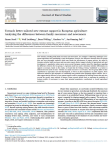Stork S., Lorleberg W., Pölling B., Yu X., Feil J.-H. (2025). Towards better tailored new entrant support in European agriculture: analysing the differences between family successors and newcomers. Journal of rural studies, 01/10/2025, vol. 119, p. 103787.
https://doi.org/10.1016/j.jrurstud.2025.103787
https://doi.org/10.1016/j.jrurstud.2025.103787
| Titre : | Towards better tailored new entrant support in European agriculture: analysing the differences between family successors and newcomers (2025) |
| Auteurs : | S. Stork ; W. Lorleberg ; B. Pölling ; X. Yu ; J.-H. Feil |
| Type de document : | Article |
| Dans : | Journal of rural studies (vol. 119, October 2025) |
| Article en page(s) : | p. 103787 |
| Langues : | Anglais |
| Langues du résumé : | Anglais |
| Catégories : |
Catégories principales 06 - AGRICULTURE. FORÊTS. PÊCHES ; 6.2 - Politique AgricoleThésaurus IAMM POLITIQUE DE SOUTIEN ; AGRICULTURE ; INSTALLATION DES JEUNES ; INSTALLATION A LA TERRE |
| Résumé : | New entrants, including both family successors and newcomers, are essential to addressing challenges in European agriculture and contributing to rural development. However, the differences between these two groups have not been thoroughly explored, which may hinder the effectiveness of support policies. We aimed to determine whether family successors and newcomers require distinct support schemes for agricultural and rural development. A quantitative online survey across several European countries tested five hypotheses regarding the differences between the two groups. A regression model was used to determine whether differentiation in support is necessary. Based on the results, we found that the feeling of being "established" as a farmer is influenced by the mode of entry-whether as a family successor or a newcomer. The two groups differ in their contributions to agriculture and rural development, as well as in their dependency on public support. These differences underscore the importance of considering entry methods when designing support schemes. The results suggest that the efficiency of new entrant support could be strengthened by tailoring schemes that take into account the specific entry methods of farmers. Future research should focus on exploring the scalability of business models of newcomers to assess their potential quantitative contributions to overall agricultural production. |
| Cote : | En ligne |
| URL / DOI : | https://doi.org/10.1016/j.jrurstud.2025.103787 |







